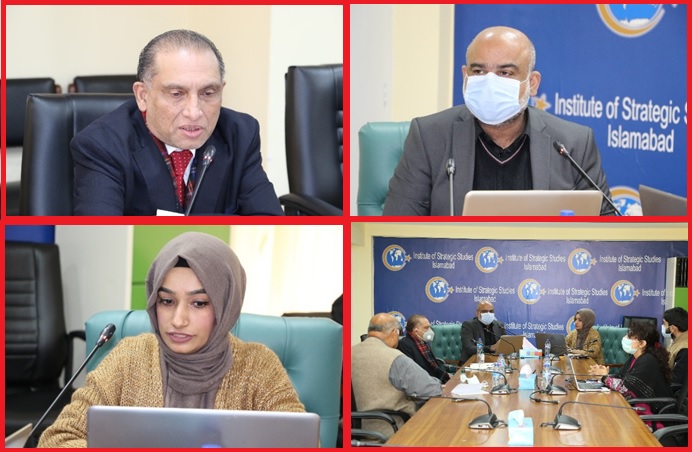Press Release
In-house Discussion
on
“US-India Strategic Tech Alliance: Options for Pakistan“
on
Tuesday, January 12, 2021

Arms Control and Disarmament Centre (ACDC) at the Institute of Strategic Studies Islamabad (ISSI) held an in-house discussion on “US-India Strategic Tech Alliance: Options for Pakistan” on Tuesday, January 12, 2021. Ms. Aamna Rafiq, Research Associate ACDC-ISSI, presented on the topic followed by an interactive discussion. The in-house meeting was attended by the members of the ISSI research faculty and ACDC advisory board.
Ms. Amna Rafiq said that the United States’ National Security Commission on Artificial Intelligence (NSCAI) in its recent report proposed the creation of a US-India Strategic Tech-Alliance (UISTA). She said that UISTA will be composed of regular working groups and high-level dialogues between the two states in seven key areas: promotion of technological innovation; expert human resource exchanges; strengthen joint research and development (R&D); accelerate security and defense cooperation; improve data –sharing ecosystem; counteroffensive information operations; technological standardization and norm building for AI; and any other technical aspect of a broader strategic landscape. This tech alliance would be one of the key components of a broader US agenda to keep India “as a key focal point” for the Quadrilateral Security Dialogue.
India and the US have signed multiple agreements. The three US-India bilateral agreements namely “the Communications Compatibility and Security Agreement (COMCASA),” “Logistics Exchange Memorandum of Agreement (LEMOA)” and “Basic Exchange and Cooperation Agreement (BECA)” hints towards a bigger tech alliance in the form of UISTA between two major Quad members in the coming years. The US is also encouraging such cooperation between India and Japan and Australia.
She highlighted that following the same model of “mini-lateral relationships,” the US has established a new trilateral partnership around emerging technologies with India and Israel, known as “T3” which is outside of Quad and would center on will ensure the reliability, openness, and interoperability of 5G technology.
The US and India are also members of a new tech alliance named “D10” conceived by the United Kingdom which aspires to bring together ten democracies of the world – US, UK, France, Germany, Japan, Italy, Australia, India, Canada, and South Korea for the global technology supply chain management
She said that these initiatives are setting the ground for greater technological cooperation with India on one hand, and the US, Australia, and Japan on the other hand. All these arrangements are like beads on one string. The underlining themes running throughout these initiatives are India, data sharing, and technological interoperability. All three themes point towards the US goal to achieve strategic advantage over China and Russia in the realm of dual-use emerging technologies.
With the re-emergence of great power competition, the US is aspiring to unite all partners for the international standardization of key emerging technologies to ensure the uniform and rapid inclusion of these technologies into national security capabilities. Formation of this global technological alliance as the most viable option to offset China’s Digital Silk Road and the Belt and Road Initiative (BRI) over the course of the next decade.
Talking about what does this means for the strategic stability in South Asia, she said that majority of these emerging technologies are dual-use in nature, these bilateral and multilateral agreements would enhance the Indian capabilities both in civilian and military domains. Along with LEMOA, COMCASA, and BECA, the UISTA will enhance data collection and analysis, access to advance satellite imagery, target acquisition capability, hypersonic missile capabilities, and advanced encryption of classified communication for the Indian armed forces. It will also boost the Indian intelligence, surveillance, and reconnaissance (ISR) capabilities vis-à-vis China and Pakistan in South Asia and the Indo-Pacific region. The UISTA will provide a huge boost to stationary as well as robotic applications of military AI.
Thus, she highlighted that India is building its military capabilities in the realm of emerging technologies with the help of the US and its allies on the pretext of the Chinese threat. This advancement of Indian emerging military technologies could not only be easily shifted towards Pakistan but also increase the military asymmetry between India and Pakistan
It will push Pakistan towards a dangerous new arms race in South Asia. Keeping in view the long-standing Pakistan-China friendship, this emerging dynamic would directly as well as indirectly affect the digital initiatives under the China-Pakistan Economic Corridor (CPEC) in Pakistan.
Talking about the options for Pakistan she said that it must build a cooperative framework with friendly countries across the globe and focus on the indigenization of emerging technologies. Perhaps a Pakistan-China technological collaboration. Other options are public-private partnership and indigenization. Pakistan may have less than a decade to catch up with technological advancements India is heading for. Pakistan has no other option except to catch up with these developments before it is too late.
Earlier, Malik Qasim Mustafa, Director Arms Control and Disarmament Centre (ACDC) at the ISSI, in his welcome remarks said that the core objective of this US initiative UISTA would be to center its Indo-Pacific Strategy vis-à-vis emerging technologies for defense and security purposes around its relations with India.
Ambassador Aizaz Ahmad Chaudhry, Director General ISSI, said that Pakistan has not focused on technological advancements and indigenization. If we do not catch up with technological advancements we will be left dependent on importing them.
The interactive discussion that followed, highlighted the importance of indigenization for Pakistan, and the US goal to create a new global technological order that would benefit it, and the challenge this creates for India to balance its technological cooperation with the US and Russia.












